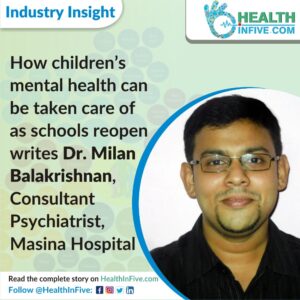
The pandemic has had an impact on children and young adults because they have been unable to go out, play with their friends, interact with their teachers and have instead been incarcerated in their houses. The continuity of online education has definitely been beneficial in terms of continuing teaching but it has had its downsides as well. Online classes have led to certain difficulties for children such as:
a) Focussing for long periods of time.
b) Lack of physical breaks unlike in school where children indulge in sports and physical activity
c) Little or no break from the screen
d) Disruption of social communication
These problems have been amplified in students who suffer from ADHD, autism spectrum disorders and other learning difficulties. The additional help and attention that they received have been difficult to provide in the online school model leading to behavioural problems and aggressive outbursts.
To add to this, some children and young people had to face deaths of new and dear ones during the pandemic. A lot of them had bear the news of relatives and friends being seriously unwell or hospitalised. Some had to experience long-term isolation from close family members such as grandparents. All these factors have played negatively on the minds of the children affecting their mental health.
Returning to Schools
There are a number of issues that children may face as they return to their respective schools. While some of them will be able to cope up with them, a number of them may need a little bit of guidance and support. They need to be sensitised and counselled so that their apprehensions are addressed. Some of the critical issues that they may face are:
1. Uncertainty: There may be a lack of confidence amongst children and young people with respect to near future, close family members whom they have seen struggling during the pandemic. Their trust quotient may have diminished leading to apprehensive thoughts of whether they will safe or not.
2. Transitions: As students education continues to be affected by the pandemic, with various restrictions in place, the usual preparation that would be done with pupils transitioning to the next school term or year will be lacking. This will be particularly challenging for those moving from primary to secondary school, those moving into exams years and those preparing to leave school.
3. Friendships and bullying: With social distancing measures — in and outside of school — friendships may have become strained or deteriorated. Some may feel safer at home.
To do Steps
It is important that enough attention is given to children and young adults during these times. They are equally affected and they need to be protected from negative thoughts and apprehensions.
1. Communication
To start with, communication is the key. It is recommended that parents and elders start talking with children, educate them about the current situation, illness and discuss about their worries, if any.
2. Sleep Routine
This should be followed by actively monitoring their sleep routine. One should encourage children to follow a good sleep routine. A good sleep everyday will keep them fresh and energised.
3. Coping Strategies
Coping strategies are what one uses when feeling anxious or stressed such as speaking with friends or family, doing regular exercises, jog, run or breathing techniques. If you feel comfortable, you could do it with them in a fun way, team them these strategies to manage their feelings.
4. Concerning Behaviour
Watch out for any concerning behaviour like being reclusive or very quiet. Don’t dismiss any concerning behaviour and seek help.
5. Be Available
Being available for your children is the best thing you can do. Give them the trust and love that they can speak to your about anything, share their logical or illogical apprehensions and feelings.
Follow Health In Five on LinkedIn, Facebook, Twitter & Instagram
Subscribe on WhatsApp & Telegram to receive real time updates






































